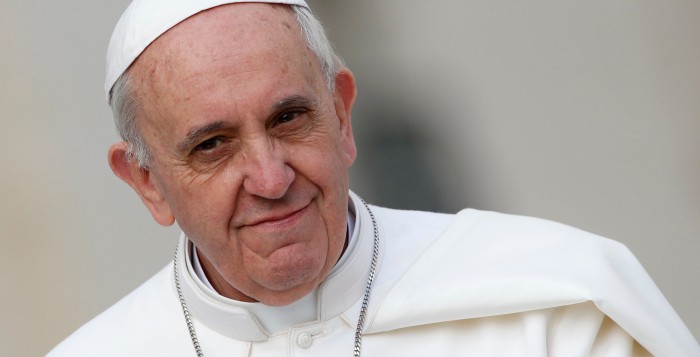Political science student Manouck Schotvanger shares her sharp analysis with us on Pope Francis. In this piece she answers the question whether our Argentinian Pope is himself more of a Marxist or a Smithsonian! 
A week after Pope Francis was installed in the Vatican, he wrote his first papal letter to the Roman Catholic Church. In this letter the Pope discussed his ideas on inequality in contemporary society. He received a lot of reactions, including Rush Limbaugh and James Pethokoukis, who called the letter respectively Marxist and accused it of hiding the truth (Cassidy 2013). This essay will examine to what extent the criticisms on the market economy of the Pope accord to the criticism of Karl Marx, and to what extent to those of Adam Smith. To examine this, there will be looked at the criticism in the papal letter first. Secondly, the views of both Marx and Smith will be examined so that eventually there can be looked at the comparison between the two political economists and Pope Francis.
The first letter of Pope Francis that was send to the Roman Catholic Church was called “Joy of the Gospel”. This letter, which is called a papal exhortation, is an official statement issued by the Vatican and used to indicate the position of the church on important matters such as abortion. A papal exhortation is ranked below the encyclical, but above an ordinary letter from the Pope (Cassidy 2013). In this particular exhortation, Pope Francis delivers criticism on the current capitalist society by stating things like:
“Humanity is experiencing a turning point in its history, as we can see from the advances being made in so many fields. We can only praise the steps being taken to improve people’s welfare in areas such as health care, education and communications. At the same time, we have to remember that the majority of our contemporaries are barely living from day to day, with dire consequences. The joy of living frequently fades, lack of respect for others and violence are on the rise, and inequality is increasingly evident.” (Francis 2013).
These criticisms are not surprising, because the current Pope developed himself to become a formalist with a clear vision for the church. Long before he had been elected to become the next one to rule the Vatican. According to Francis, the church should develop itself as an institution acting for and on behalf of the homeless. He wants, as he calls it, “a poor church and for the poor.” (Vallely 2013). Moreover, there was already talk of a discussion on these points in the sixties and seventies of the last century. The liberation theory wanted to make sure that the Roman Catholic Church was setting priority on helping the poor, but the Vatican held back on this point (Cassidy 2013). Besides, Francis states in his letter that the material progress, which is part of the growth of the market, is based on the exclusion and suffering of those without any power. The Pope calls this amoral and writes the following about this subject:
“[…] some people continue to defend trickle-down theories which assume that economic growth, encouraged by a free market, will inevitably succeed in bringing about greater justice and inclusiveness in the world. This opinion […] expresses a crude and naïve trust in the goodness of those wielding economic power and in the sacralized workings of the prevailing economic system. Meanwhile, the excluded are still waiting.” (Francis 2013).
Finally, Pope Francis states in his letter that a globalization of indifference has arisen. People are less and less concerned with society’s poor and have less sympathy when it comes to others. This is because of the focus on the culture of prosperity, which ensures one to become less and less involved in society. Also, the growing difference in wealth between the rich and the poor becomes bigger with great speed. This disparity is the result of economic ideologies of capitalism.
Karl Marx was a German philosopher who lived from 1818 till 1883. Marx studied the relationship between capital and labor, because according to him this was the key to understanding the capitalist system (Stilwell 2012: 350). He believed that capitalism led to economic inequality, social conflicts and periods of crisis (Stillwell 2012: 62). He also wanted the working class to organize themselves in order to challenge the capitalist society (Stillwell 2012: 100). Marx divided society into two groups; the bourgeoisie had all the power in their hands and owned the means of production, while the proletariat was often poor and offered their labor to the bourgeoisie in order to make money. He recognized that this distribution lead to a concentration and centralization of the capital that was produced, which eventually lead to a growing inequality between different economic classes (Stillwell 2012: 215).
Furthermore, Marx thought that the ruling class was exploiting the workers in the capitalist system. This was unjust, after all, there were so many economic differences that there could be no equality (Stillwell 2012: 352). The solution Marx offered for the improvement of the society was laying the stress on the social relationships between individuals, rather than on the individuals themselves. He was very negative about the capitalist system and wanted to exchange it for a different system now known as communism. This system would ensure less disparity, because everyone would have the same goals and would draw from the same sources. Everything would be jointly owned, which would create a just society.
Adam Smith was a Scotsman from Kirkcaldy and lived from 1723 till 1790. He built upon the ideas of the Dutchman Mandeville. For example, this is reflected in his effective competition theory that involves the ‘invisible hand’, which ensures that the owners of capital and labor use their resources as efficiently as possible. Smith was an advocate of free trade, but he was ambivalent about the morality and the practice of market forces. He found that free trade and a self-regulating market were key factors for social progress (Stillwell 2012 : 67). He added, however, that if the government does not pay attention, free trade and a self-regulating markets may lead to greater economic inequality (Stillwell 2012: 79; Schwartz 2010: 43).
Smith was against this inequality, which according to him, among other things, came from the division of labor theory. This theory holds that there is a division of labor, thus creating specialization, which will ultimately lead to greater productivity (Schwartz 2012: 50). In addition to this theory, there were other factors that lead to inequality. Smith said that free market capitalism would eventually lead to anti-social business behavior and that the government should pay attention to this. Its main jobs are to maintain justice and protect individual rights, property, reputations and relationships (Stillwell 2012: 77). It is clear that Smith was against great economic inequality, his vision to solve this disparity was a society in which everyone would make a personal contribution to economic progress. This meant that eventually everyone would be better off and there would be less unevenness within society (Stillwell 2012: 77).
Now that the positions of both Pope Francis as well as Karl Marx and Adam Smith are evident in the field of the cases being discussed in the papal exhortation, it is possible to answer the aforementioned research question of this essay. This question was: “To what extent resembles the critique of the market economy of Pope Francis to the criticism of Karl Marx, and to what extent to those of Adam Smith?”
The question above can be answered as followed. All three men agree on the fact that inequality in a society is a bad thing. The differences are in where this inequity comes from. The criticism of Pope Francis accords to the criticism of Karl Marx to the extent that both men believe that inequality stems from capitalism and the desire for constant growth of the economy. This is unjust and makes man indifferent. The criticism of the Pope accords to the criticism of Adam Smith to the extent that they both believe that capitalism, free trade, and a self-regulating market are certainly needed in our contemporary society, but these things also create disparity. Adam Smith also says that division of labor and anti-social business behavior provide an unequal society. The Pope observed that a lot has already been done in today’s economy, but there are still poor people out there who can be helped.
Political economists Karl Marx and Adam Smith agree with the statement that was written by the Pope in his letter: “Money must serve, not rule!” (Francis 2013). This shows that the Pope is chasing the classics, the question, however, is how long it will take before the desired change of the men have been implemented.
Bibliography
Cassidy, J. (2013). “Pope Francis’s Challenge to Global Capitalism”. The New Yorker, 3 december.
Francis, Pope. (2013). Evangelii Gaudium. Joy of the Gospel. Vaticaan: Vatican Press.
Schwartz, H.M. (2010). States verus Markets. The Emergence of a Global Economy. New York: Palgrave Macmillan.
Stilwell, F. (2012). Political Economy. The contest of economic ideas. South Melbourne: Oxford University Press.
Vallely, P. (2013). Pope Francis. Untying the Knots. New York: Bloomsbury Continuum.

 The ’Ndrangheta’s Infiltration and Threat to European Institutions
The ’Ndrangheta’s Infiltration and Threat to European Institutions  From Paper to Practice: How Grassroots Norms Undermine Gender Rights in Pakistan
From Paper to Practice: How Grassroots Norms Undermine Gender Rights in Pakistan  Exploited Childhoods: The Role of Global Corporations in Perpetuating and Mitigating Child Labour
Exploited Childhoods: The Role of Global Corporations in Perpetuating and Mitigating Child Labour  Human Rights Challenges in Addressing SLAPPs in Media, NGOs and Journalism in the EU
Human Rights Challenges in Addressing SLAPPs in Media, NGOs and Journalism in the EU 